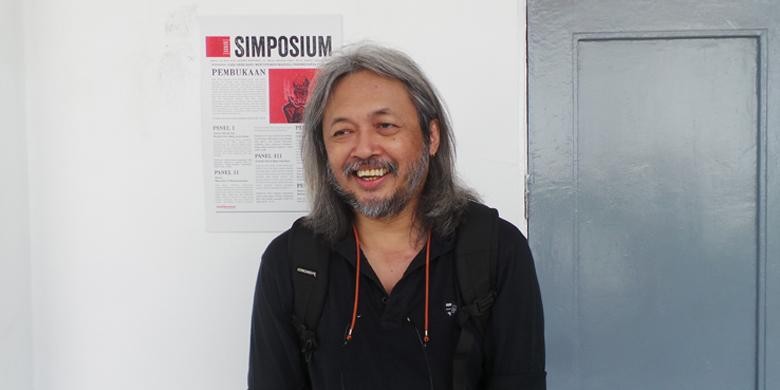Popular Reads
Top Results
Can't find what you're looking for?
View all search resultsPopular Reads
Top Results
Can't find what you're looking for?
View all search resultsSeno Gumira Ajidarma: No rest for the wicked
Seno Gumira Ajidarma is a man of many talents. He is a writer, journalist, photographer and currently an academic.
Change text size
Gift Premium Articles
to Anyone
R
ector of the Jakarta Arts Institute (IKJ) Seno Gumira Ajidarma’s whole being exudes the spirit of his many intellectual pursuits. From his late teenage years until now, the 58-yearold has consistently shown himself to be a versatile and prolific writer, with an almost terrifying productivity rate.
He has written hundreds of short stories, essays, columns, novels, reportage and plays, among other literary works.
As if that was not enough, he is also writing a dissertation analyzing popular 1960s comic book Panji Tengkorak (The skull-faced man), teaches at IKJ and serves as curator and judge in various writing competitions.
His hectic schedule late last year saw him being appointed as IKJ rector, reviewing hundreds of manuscripts submitted to the Jakarta Arts Council’s (DKJ) biannual novel competition, finishing the third volume of his Nagabumi novel series and preparing for the publication of his latest novel Drupadi, which was launched on Jan. 9 by Gramedia Pustaka Utama.
Seno started writing in 1974, when he was 16 and a senior high school student. He liked reading so much he could not resist writing pieces of his own too.
He might have inherited his love for intellectual pursuits from his highly educated parents: his late father Mohammad Setiadji Sastroamidjojo attained a PhD degree in physics and was a prominent alternative energy expert from Gadjah Mada University (UGM) in Yogyakarta. His late mother, Poestika Kusuma Sujana, was an internist.
(Read also: Poet turns down Bakrie Award)
Now decades later, writing has become an automatic process for him.
“My ideas come from everything. When I drive [my car] and see something, my brain goes tick tock, I think about something. For me, thinking is as automatic as breathing. I do it constantly. I will translate my thoughts into writing when I have time. You can’t write while driving a car, obviously,” he said, laughing. Seno is famous for his adage, Ketika jurnalisme dibungkam, sastra harus bicara (When journalism is silenced, literature must speak up), which was also the title of his essay that was part of his famous Trilogi Insiden (Incident trilogy) published in 1997. The trilogy includes Saksi Mata (Eyewitness) and Jazz, Perfume & the Incident.
The trilogy explores the massacre that took place in Dili, Timor Leste, which was occupied by Indonesia during the totalitarian New Order era in literary form, as local media reports about the incident had been hushed up.
Although the totalitarian regime is no longer in power in the country, Seno warns that this does not mean Indonesian writers now have the freedom to overtly say whatever they want without having to bear significant consequences.
“Do you think you can explicitly say that you advocate the disintegration of Papua, or can call certain radical mass organizations goblok [stupid], or dare to question the legitimacy of the sultanate system in Yogyakarta? Do it if you dare. There’s always a dominant power,” he says.
In the reform era, he says, it is actually becoming more dangerous for writers than ever.
“During the New Order era, we had clear enemies. Now, we don’t even know who our enemies are, but they are out there. This is why you still need to be careful when writing your pieces. You don’t always have to attack the powers that be in an overt manner. [The quality of] criticism isn’t gauged by how loud you are, but how emancipatory it is.”
This is where sound writing skills are needed to complement the instinctive side of it.
(Read also: Tumblr blogs to follow for aspiring writers)
Talking about technique, Seno, who curated the emerging writers wing of last year’s Ubud Writers & Readers Festival as well as judging the manuscripts of the DKJ biannual novel competition, said he was impressed by the sophistication shown by Indonesia’s young writers.
“They write perfectly, with no linguistic errors. Their themes chronicle the new Indonesia. Research has become a new lifestyle for writers, just one click away,” he said.
He was optimistic about the future of Indonesian literature, with more diverse styles of writing and themes, and is passionate about grooming young artists through IKJ.
When asked whether he was burdened by his administrative workload as a rector, he said: “I take that as my duty. The art world needs activism,” he said.
In his new role in IKJ, he said one of his programs was to strengthen the academic aspect of the institute’s curriculum in the hope that the campus could produce artists well-versed not only in aesthetics but also research methods.
This notion of activism for the arts seems to seep over everything he does: he seems to enjoy his huge number of activities, be it writing, reporting for his panajournal.com platform or teaching and managing IKJ, because he sees this activism as going beyond profession and formal titles.
His activities make him tick. He laughed when asked whether he ever gets tired.
He said he has to always change his physical settings — swimming to have a break from sitting, going on a photo hunt to not only get up from his seat but also get outdoors — to attain a balanced life.
“I’m not burdened by them; they are part of my life. Like farmers who cultivate the land. Like what [the late musician] Harry Roesli said, for other people, music is entertainment, but for him, music is work. I write and work in a very relaxed manner. Work doesn’t always have to be a burden.”











